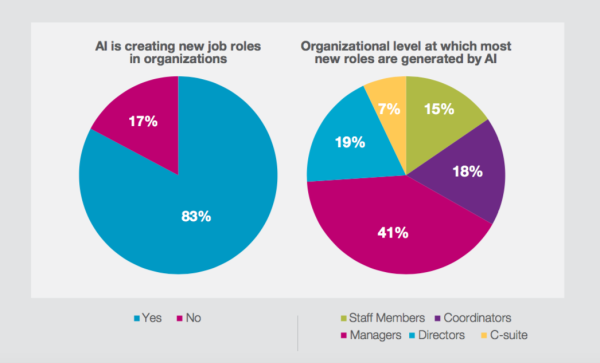06 October 2017
Companies deploying AI say their aim is to maximise the capabilities of their human resources.
Fears about artificial intelligence leading to massive job losses in the short term are ill-founded, according to Capgemini.
After studying the use of AI in corporate environments, the consulting firm found that four out of five companies have actually created new jobs as a result of the technology.
For its recent Turning AI into concrete value: the successful implementers toolkit report, Capgemini polled 993 organisations with revenues of more than $500m that are implementing AI, either as a pilot or at scale.
Respondents were from the automotive, banking, insurance, manufacturing, retail telecoms and utilities sectors in Australia, France, Germany, India, Italy, Netherlands, Spain, UK and US.
The research found that 83 per cent have created new jobs as a result of AI technology. These roles are at a senior level, with two in three being created at the grade of a manager or above.
Furthermore, among those that have implemented AI at scale, 63 per cent said that AI has not destroyed any jobs in their organisation.
According to Capgemini, organisations see AI as a means of reducing the time employees spend on routine and administrative tasks to enable them to deliver more value.
Seventy-one per cent of those surveyed said they have proactively initiated upskilling/re-skilling of employees to take advantage of their AI investments.
Four out of five organisations say AI has created new roles. SOURCE: Capgemini Digital Transformation Institute, State of AI survey
“What we really want to do is to use humans to the best of their capabilities,” said Michael Natusch, global head of AI at Prudential. “AI is taking away the time humans previously spent on repetitive issues and allowing them to focus on where human intelligence can drive value – for both themselves and for customers.”
Capgemini said that the “tech-savvy businesses” that are using AI are finding that it is increasing sales – its research found that three-quarters of firms are already seeing a 10 per cent uplift in sales since starting to use the technology.
However, the study also indicates that many organisations have yet to align their AI investments with business opportunities.
“In the hands of the technologists, businesses are prioritising challenging AI projects and missing lower hanging fruit,” said Capgemini. “More than half (58 per cent) are focused on ‘need to do’ implementations, or those that are high complexity/high benefit projects like customer service issues; while only 46 per cent are deploying ‘must do’ AI implementations with low complexity/high benefit."
The firm said hat if companies tackled both problems simultaneously, they could see higher business benefits. For instance, it reckons that those implementing a large number of “must do” use cases are able to reduce churn by up to 26 per cent on average.
The research also revealed the established and highly-regulated sectors are leading on AI innovation: 49 per cent of telcos, 41 per cent of retailers and 36 per cent of banking institutions have seen the highest implementation of AI at scale.
The automotive (26 per cent) and manufacturing (20 per cent) industries are those currently with the lowest levels of utilisation among companies implementing the technology.
Furthermore, Capgemini said that there is a “stark” contrast across regions, as well as sectors.
Among AI implementers, 58 per cent of Indian companies are already using the technology at scale, followed by Australia at 49 per cent.
European countries, including Spain (31 per cent), the Netherlands (24 per cent) and France (21 per cent) are further down the list of those using AI, indicating firms in these markets are not yet ready to adopt the technology.
Turning AI into concrete value: the successful implementers toolkit










